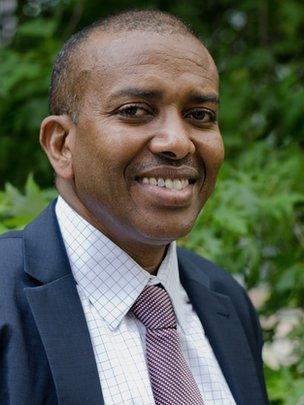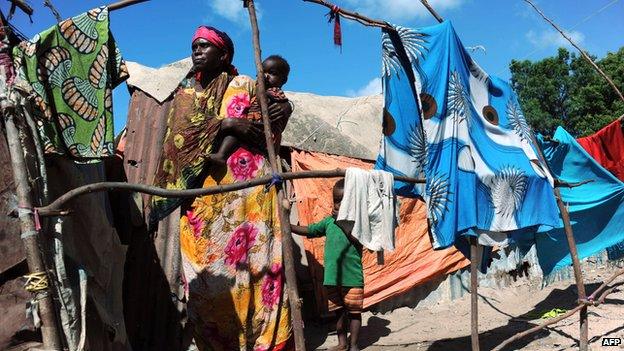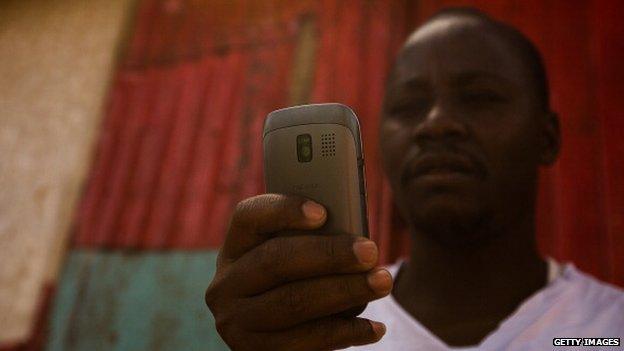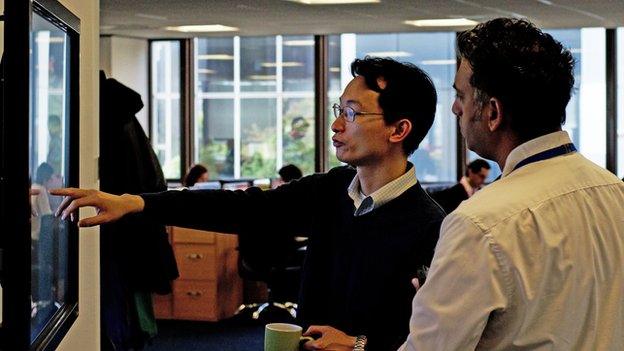The man changing the world of remittances
- Published

In the years following the attacks of 11 September 2001, it is not surprising that Western security forces and authorities clamped down hard on the money transfer industry.
Fearful that some remittances being sent to countries in eastern Africa, the Middle East and South Asia could be being used to fund terrorist activities, a number of smaller money transfer companies were shut down.
While completely understandable from a security point of view, the knock-on effect was that many innocent people in places such as Somalia suddenly found that it was much more difficult to receive vital funds from expat relatives living in the West.
This was money they needed to put food on the table, or clothe their children, or keep a roof above their heads.
One man who was increasingly aware of the problem was Ismail Ahmed. He was born and raised in Somaliland, the autonomous northern part of Somalia, before being educated in the UK after winning a World Bank scholarship.
In his early 30s at the time, Mr Ahmed was an expert in remittances and the money transfer industry, having focused on the subjects while doing a PhD in development economics at Imperial College in London.
Turning his expertise into a business opportunity, and wishing to help, he started to advise a number of smaller money transfer firms, both in the UK and overseas, on how they could best meet the more stringent security rules.
Such was his success in doing so that in 2004 the United Nations Development Programme - the UN agency which aims to improve conditions in the developing world - asked him to join their team which was trying to tackle the same problem.
Yet after an unhappy time at the UN, which saw him quit after becoming a whistleblower to fraud and corruption, Mr Ahmed determined to launch his own money transfer business.
He recognised that if he created such a firm that was as digitally-based as possible, he could both be as security conscious as possible, and keep costs down enough to enable him to offer substantially lower transaction fees than the industry leaders.
So the idea for his new company, WorldRemit, was born.
No agents
To understand how WorldRemit works, it is necessary to look at the long-established business model for sending remittances by money transfer firms.

Many people in Africa rely on remittances from relatives in the West
Typically this involves person A in a rich country paying cash to an agent of the transfer firm, be it a bank branch or accredited corner shop.
The money is then transferred to a nation in the developing world, where person B goes to another agent of the transfer firm, again typically a bank or shop, or bureau de change, and then withdraws the money in cash. If the money is sent to a bank, it doesn't go directly into a person's account.
This is the model that global leaders Western Union and MoneyGram, and their hundreds of smaller rivals, have followed for decades.
The security concern in this post 9/11 world is whether this system of money transfer is at risk of abuse, such as people using false identification, or trying to launder money.
It is a concern which has cost the big players rather a lot of money in fines. In 2010 Western Union was fined $94m (£60m) by the state of Arizona for not doing enough to prevent money laundering by Mexican drugs gangs, while in 2012 MoneyGram had to pay a $100m penalty.
Then last year, UK bank Barclays announced that it was closing the accounts of all but 19 of its 165 clients in the remittance transfer business.

Users can send money via WorldRemit's website or mobile phone app
To mitigate such security concerns, on the sending side of remittance transfer WorldRemit only accepts funds electronically via its website or mobile phone app - it doesn't have any agents to whom you can turn up with a big bag of banknotes.
Mr Ahmed explains: "Being digital enables us to be as security stringent as possible.
"We screen all our transactions against sanction lists, and we can pick out suspicious or unusual behaviour almost immediately. For example, when someone tries a number of cards to get one of them to work - no legitimate customer would do that.
"And we aren't reliant upon a busy shopkeeper to do the security work for us."
Mr Ahmed adds that such a digital only approach also enables WorldRemit to charge fees that are less than half those of the big players, a statement which is confirmed when you check its prices against those of the likes of Western Union.
Less cash pick-ups
WorldRemit also says it is at the forefront of digitalising the receiving end of remittance exchanges, with cash pick-ups only accounting for one third of its transactions, compared with 95% for the market as a whole.
The other two thirds of WorldRemit transactions see people get paid the money directly to their bank account, or increasingly, to their mobile phone.

A growing number of Africans are using their mobile phones as cash cards
The latter has been made possible after WorldRemit signed agreements with mobile phone networks and payment systems such as Ecocash in Zimbabwe, which enable people to use their mobile phones as if they were cash cards.
And while the big players in the industry are now also increasingly offering digital transfers and pick-ups, Mr Ahmed says that none yet come close to WorldRemit's global reach.
For example, while Moneygram will only allow online transfers to bank accounts in nine countries, at WorldRemit it is more than 50.
Mr Ahmed says: "In many countries and cities you have to remember that people don't want to have to be walking around with cash for security reasons.
"Also it is often a very long walk to the nearest bank, which could be closed."
Growing fast
Mr Ahmed launched WorldRemit in 2010 after first doing a master of business administration (MBA) course at London Business School (LBS), as he said he needed to increase his skills at running a business.
While at LBS he successfully pitched his idea to some wealthy investors who bought a stake in the business.

WorldRemit's workforce has grown fast in the past year
An investment fund has subsequently also come on board.
WorldRemit has its headquarters in west London, and this year has seen its workforce triple to 110 people.
It currently helps people around the world make 200,000 transfers a month. This is a drop in the ocean compared with Western Union or MoneyGram, but Mr Ahmed says he has the ambition to grow strongly.
"I'm proud to be making a difference to people's lives," says Mr Ahmed.
Follow Will Smale on Twitter @WillSmale1, external